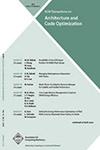Hardware Hardened Sandbox Enclaves for Trusted Serverless Computing
IF 1.8
3区 计算机科学
Q4 COMPUTER SCIENCE, HARDWARE & ARCHITECTURE
引用次数: 0
Abstract
In cloud-based serverless computing, an application consists of multiple functions provided by mutually distrusting parties. For secure serverless computing, the hardware-based trusted execution environment (TEE) can provide strong isolation among functions. However, not only protecting each function from the host OS and other functions, but also protecting the host system from the functions, is critical for the security of the cloud servers. Such an emerging trusted serverless computing poses new challenges: each TEE must be isolated from the host system bi-directionally, and the system calls from it must be validated. In addition, the resource utilization of each TEE must be accountable in a mutually trusted way. However, the current TEE model cannot efficiently represent such trusted serverless applications. To overcome the lack of such hardware support, this paper proposes an extended TEE model called Cloister , designed for trusted serverless computing. Cloister proposes four new key techniques. First, it extends the hardware-based memory isolation in SGX to confine a deployed function only within its TEE (enclave). Second, it proposes a trusted monitor enclave that filters and validates system calls from enclaves. Third, it provides a trusted resource accounting mechanism for enclaves which is agreeable to both service developers and cloud providers. Finally, Cloister accelerates enclave loading by redesigning its memory verification for fast function deployment. Using an emulated Intel SGX platform with the proposed extensions, this paper shows that trusted serverless applications can be effectively supported with small changes in the SGX hardware.用于可信无服务器计算的硬件强化沙箱飞地
在基于云的无服务器计算中,应用程序由相互不信任的各方提供的多个功能组成。对于安全的无服务器计算,基于硬件的可信执行环境(TEE)可以提供功能之间的强隔离。但是,不仅要保护每个功能不受主机操作系统和其他功能的影响,还要保护主机系统不受这些功能的影响,这对云服务器的安全性至关重要。这种新兴的可信无服务器计算提出了新的挑战:每个TEE必须与主机系统双向隔离,并且必须验证来自TEE的系统调用。此外,每个TEE的资源利用必须以相互信任的方式负责。然而,目前的TEE模型不能有效地表示这种可信的无服务器应用程序。为了克服这种硬件支持的缺乏,本文提出了一种名为Cloister的扩展TEE模型,该模型专为可信无服务器计算而设计。Cloister提出了四个新的关键技术。首先,它扩展了SGX中基于硬件的内存隔离,将部署的函数限制在TEE (enclave)内。其次,它提出了一个可信的监视enclave,用于过滤和验证来自enclave的系统调用。第三,它为enclave提供了一种可信的资源记帐机制,服务开发人员和云提供商都同意这种机制。最后,Cloister通过重新设计内存验证来加速enclave加载,以实现快速的功能部署。本文使用一个带有所提出扩展的模拟Intel SGX平台,表明只需对SGX硬件进行很小的更改,就可以有效地支持可信的无服务器应用程序。
本文章由计算机程序翻译,如有差异,请以英文原文为准。
求助全文
约1分钟内获得全文
求助全文
来源期刊

ACM Transactions on Architecture and Code Optimization
工程技术-计算机:理论方法
CiteScore
3.60
自引率
6.20%
发文量
78
审稿时长
6-12 weeks
期刊介绍:
ACM Transactions on Architecture and Code Optimization (TACO) focuses on hardware, software, and system research spanning the fields of computer architecture and code optimization. Articles that appear in TACO will either present new techniques and concepts or report on experiences and experiments with actual systems. Insights useful to architects, hardware or software developers, designers, builders, and users will be emphasized.
 求助内容:
求助内容: 应助结果提醒方式:
应助结果提醒方式:


